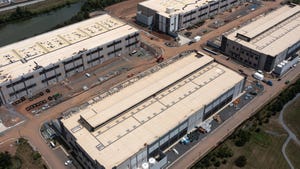EMS: Big Data Crunching in a Small PackageEMS: Big Data Crunching in a Small Package
The Federal Aviation Administration (FAA) is using a mobile enclosure from Elliptical Mobile Solutions (EMS) for conducting sensitive research into the safety of space tourism.
April 2, 2013


RASER-back-angle
Space tourism is closer than you think. And as government agencies sort out the safety implications of consumer space flights, they need to crunch a lot of scientific data without building a new supercomputer. Enter the micro-modular data center.
The Federal Aviation Administration (FAA) is using a mobile enclosure from Elliptical Mobile Solutions (EMS) for conducting sensitive research into the safety of space tourism. The FAA engaged Nor-Tech to provide the processing horsepower to analyze data from radiation propagation studies, which examine the amount of radiation passengers and crew would be subjected to as they reach altitudes up to 100 kilometers above earth. These are the same issues the Fantastic Four faced on their inaugural mission; however, radiation causing stretchy powers in real life is less than unlikely.
The FAA needed a solution that could work outside a traditional data center. Nor-Tech turned to Elliptical Mobile Systems, a company in Chandler, Ariz. that makes “micro-modular” data centers, which adapt many of the principles of containerized data centers to a smaller form factor. The project had some very unique needs, including high density in limited amount of space, so EMS was a perfect fit.
For the FAA project, Nor-Tech used Elliptical Mobile's EMS R.A.S.E.R. HD Micro-Modular Data Center, populated with a cluster of Intel Xeon processors and Seagate Constellation series disk drives. The solution was developed by Nor-Tech over a two and a half year period of collaboration with FAA medical doctors, physicists, and engineers. The medical research arm of the FAA required a High Performance Computing (HPC) solution that could function securely in the field, outside of the data center and in varying physical conditions.
Due to security concerns pertaining to the work being done on this system, it was required that the system not be connected to the Internet, according to the case study.
The FAA selected Nor-Tech to develop an HPC solution to conduct its research, due to its extensive experience and innovation in the field of portable and "ruggedized" clusters. "A unique requirement for this project was the high density of computing that was needed due to limited deployment space,” said Dom Daninger, Nor-Tech’s VP of Engineering, “EMS assisted Nor-Tech with the design of the R.A.S.E.R. HD cabinets which can handle up to 80KW of power for each 42U enclosure. This gives Nor-Tech an unprecedented density of computing. The enclosure's robust liquid cooling system allows it to be completely sealed without the risk of overheating."
"We are pleased to have been selected by the FAA and Nor-Tech to be a part of this groundbreaking research study," said Tony Cole, the CEO of Elliptical Mobile. "At EMS we are always pushing the boundaries to develop data center solutions that save money, time, energy and space. Commercial space travel research is just one more boundary we look forward to advancing."
"We definitely see growing acceptance of these smaller modules," said Cole. "They're plug-and-play. We've got a pre-designed architecture so you don't need to do airflow modeling."
About the Author
You May Also Like







